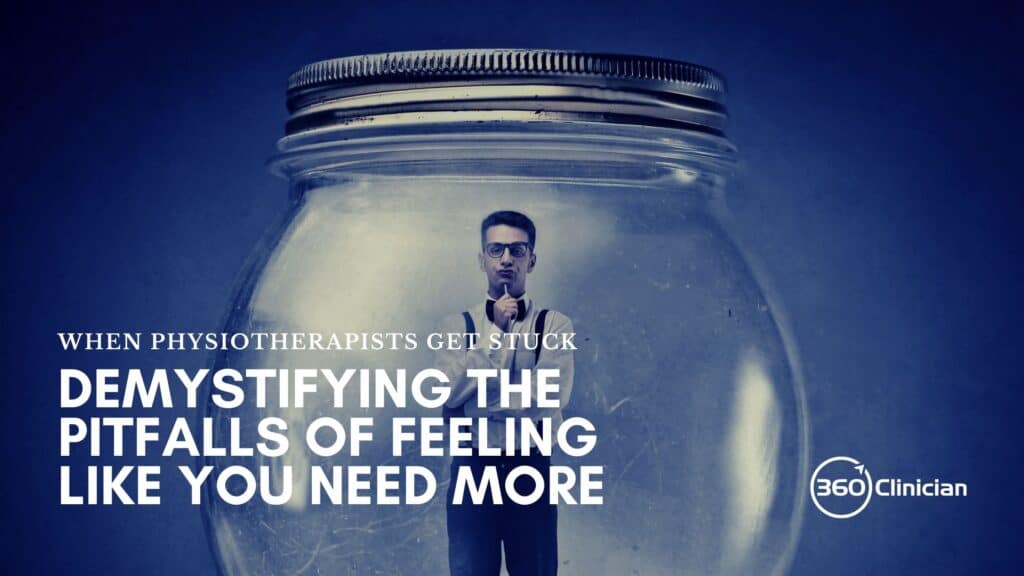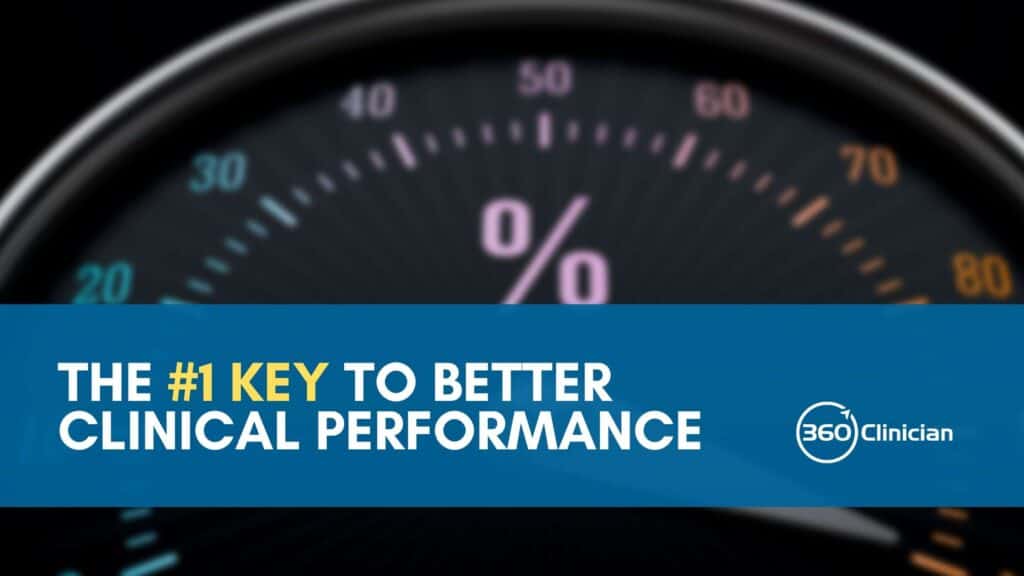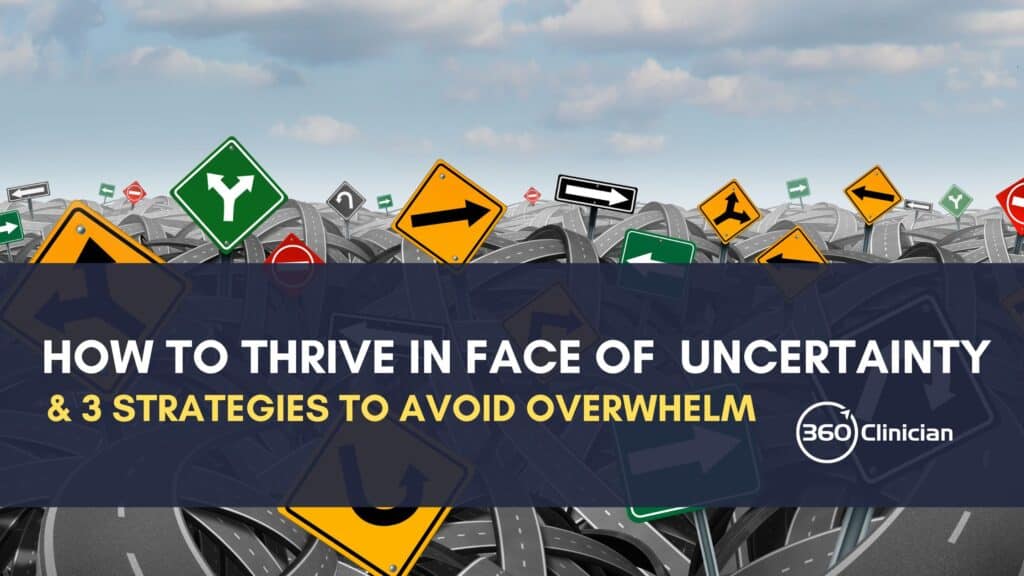As physiotherapists, it’s easy to feel like we need more of something when the work we’re doing doesn’t seem to be getting the results that we want.
When we get stuck with our treatments, we think it’s because we lack something. It can feel like there is always another course or certification that will make all the difference in our practice – but what if those things are not really the answer?
What if feeling stuck has more to do with how we approach our work than with what we actually do?
The common wisdom within the physiotherapy community coming at us from all directions within the physiotherapy community is the message that to get better results with your clients you need MORE!
You hear that you need:
- more knowledge
- more technical skills
- more certifications
- more post-grad courses
- more years of experience.
A Common Analogy that May Be Holding You Back
A common analogy within the physiotherapy community is one of a toolbox. And the goal is to have more tools in your toolbox so you can get better patient results. It becomes a point of pride to have more tools in your toolbox, and we’re expected to believe that a greater number of tools will lead us to better results with our clients.
Makes sense, right?
But what if having more tools in your toolbox doesn’t actually make you any better at doing physiotherapy? What if there’s something else entirely going on here?
The foundational tools we started out from our initial physiotherapy training can become crowded out and forgotten as a result of our need to learn as many new skills and techniques are possible.
One of the side effects of this focus on adding more tools to our toolbox is that it erodes our confidence in the foundational tools that we have already learned. Instead of feeling assured in our application of our existing skills, we can start to feel that they are inadequate and out-of-date.
Another downside with focusing on adding more tools to one’s toolbox is that it can blind us to our own unique tools that we bring because of who we are and our own personal life experiences.
The perspective, creativity and interests we bring to the table are a result of our own personal history, which is not universal.
One of the best ways to overcome feeling stuck is by simplifying our perspective. The more you focus on what there’s not enough of, the less you see what is available and working in your life.
Stop and explore your own creative genius as physiotherapists
We all start out as creative geniuses in our childhood years.
In 1968 researcher, George Land surveyed 1600 children to determine how many kids had genius levels of creativity. Here’s what he found:
- 5 year olds: 98%
- 10 year olds: 30%
- 15 year olds: 12%
When the same test was given to a sample of adults, only 2% had genius levels of creativity!
Early in life, we are regularly tapping into our own creativity and exploring the world with unbounded curiosity.
Yet, overtime we discredit this part of ourselves and lock it away, as we continue to work tirelessly to get MORE (i.e., more courses, more certifications, more knowledge).
The truth is, we most likely have all of the tools necessary to be successful physiotherapists right now. What we do need instead is an understanding of ourselves and the motivations driving our decisions.
In my own clinical experience, I’ve regularly battled the sense of inadequacy. Truthfully, it started on the first day of physiotherapy school. I came into physiotherapy school with a non-kinesiology background. The intimidation I felt was palpable.
Unfortunately the inadequacy only intensified after school was finished. I was unprepared for the realities of working in a clinical setting. I lacked confidence and felt like more of an imposter than ever before.
So what gave me that sense of knowing?
What helped me to get back on track after my inadequacy threatened to overwhelm me?
Here’s where it gets interesting: It wasn’t post-grad courses or unending certifications that was the answer.
I needed to tap into my own resources.
The key to falling for the more trap was to move into a deeper place of self-awareness with regards to assets or resources I could bring to my clinical experience and to my patients. I had to learn how to recognize when my feelings of inadequacy were holding me back and get out from underneath them in order for growth to take place.
One of my resources or assets is my skill in systems thinking. I excel in connecting the dots and lateral thinking to come up with creative solutions. This awareness helped me to focus my development as a clinician into deepening my understanding and skill in movement system evaluation and treatment.
Whenever I heard of classmates taking yet another postgrad course, I would remind myself to avoid chasing the latest treatment technique and focus on the resource of systems thinking.
Here’s How to Uncover Your Own Resources
Sometimes it can feel hard knowing how to tap into your innate resources. When you are trying to identify your resources, it can be helpful to think about how you were raised and what environments allowed for the expression of those skills.
It’s also a good idea to consider those pivotal flow moments in your life, whether in the clinic or in the rest of life. Where did you feel most alive and creative in your life?
Journaling about these experiences can be a great starting point to uncover the gifts and resources you bring to your clinical practice. The process of reflecting on your life’s experiences can help you uncover the hidden resources that are necessary for you to be successful in your practice.
Remember This: Pause Before You Strive for More
So the next time that you’re struggling with whether or not you need more of something (e.g. course, certification) ask yourself where your motivation is coming from.
If you’re feeling the pressure (external or internal) to add another course, certification, etc, ask yourself where the motivation is coming from.
There’s nothing wrong with wanting to learn new things – as a practicing therapist myself I’m always seeking out opportunities for me and my clients.
But a gut check is important.
Is the motivation coming from a place of unhappiness, lack or feeling like you’re not enough? If so pause. Breathe. And take some time for self-reflection and explore what’s underneath.
Is it a sense of inadequacy? Are you comparing yourself to peers? Feeling like you’re not measuring up as a therapist?
Remember that whatever the ‘more’ is won’t answer your own sense of inadequacy, comparison or personal doubt.
And it won’t change the fact that you are enough.
Remember that.
You are enough.
You’re enough with your years of experience.
You’re enough with your existing skill set.
You’re enough with your clients.
You’re enough just as you are.
When you start from this place, it’s easier to shift your focus and mindset.
It becomes a way of stepping into yourself in order to see what you need next as an individual therapist.
And if that ‘more’ is something like more courses or certifications? You can move towards that goal but without the weight on your back about feeling imprisoned with the weight of not feeling enough.
To better flow,Andrew
If you enjoyed this article and want to stay up-to-date on my newest content, sign up for the Clinical Flow Newsletter! There you will have access to special offers, exclusive content, and be part of a growing community of clinicians with the purpose of improving yourself and your clinical practice.


